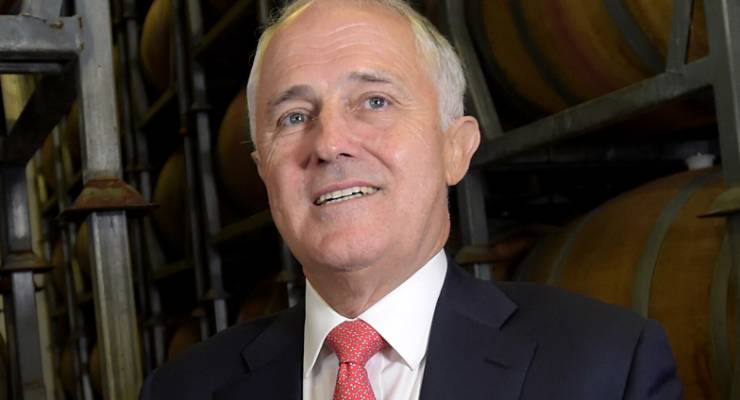
There’s a story about elections and racism Lyndon Johnson used to tell; like nearly all of LBJ’s stories it was self-serving and almost certainly invented. He claimed an old Southern senator — Democratic, of course, because they were all Democrats back then — had once told him he’d like to go home and give one final proper Democratic speech, about how his state could develop its economy and pay its citizens good wages if only it could wrest control of its resources back from those who had dispossessed it. “They haven’t heard a Democratic speech in 30 years,” LBJ would quote the senator as saying. “All they ever hear at election time is ‘nigger, nigger, nigger’.”
It’s not quite as blatant, but replace the offensive term with “border, border, border”, and Australians are being treated the same.
You’ll recall that Malcolm Turnbull’s campaign began on a rather positive note. It was all about his “national economic plan”. In the immediate aftermath of the budget (remember that?) Turnbull was the Man With the Plan. In interviews the day after the budget, he mentioned the plan 50 times, according to his own office’s transcripts, including 21 times in one interview with the unfortunate David Koch. And when he finally launched the election campaign on May 8, the Prime Minister referred to his plan 20 times. And that’s not counting the various subsidiary plans, like his defence industry plan or his enterprise tax plan.
The theme continued in the first week of the campaign — every media event, Turnbull would repeat, over and over, that he had a plan and that Labor didn’t have a plan or, alternatively, that Labor did have a plan, but it was a terrible one. Turnbull’s plan, as you know, was for “jobs and growth”. Last Friday, he mentioned the plan 25 times.
That all came to a shuddering halt this week. Mentions of the plan went from a flood to a trickle; Turnbull, once logorrheic about his plan, didn’t even mention it last Sunday. There were just four mentions on Monday, just three yesterday. Instead, there was a new word that he constantly repeated — “border”. He said it 20 times at a campaign event at an Australian Border Force facility in Darwin (in addition to mentioning his hosts repeatedly), then 11 times the following day in far north Queensland.
Turnbull doesn’t refer to boats as often as his predecessor did; he prefers “borders”. One of the key moments in the last days of his prime ministership was when Abbott was asked by Leigh Sales about the economy and reflexively began speaking about “stopping the boats”. Days later, when Turnbull launched his challenge and attacked Abbott’s sloganeering, Abbott couldn’t help himself and did it again, as if to demonstrate Turnbull’s point. But Turnbull did utter the magic phrase “stop the boats” himself on Tuesday.
The jettisoning of “the plan” to resort to the tried-and-tested tactic of demonising asylum seekers reflects poorly on the selling of the budget by Turnbull and his Treasurer, Scott Morrison. As Crikey reported last week, while voters were underwhelmed by the budget, and it rated well below Joe Hockey’s 2015 budget for them, there were some definite positives in it. Voters approved of the tobacco excise rise, and curbing superannuation tax concessions, a crackdown on multinational tax avoidance and the planned intern program. They even endorsed, albeit with less enthusiasm, the company tax cut, despite the massive cost associated with it.
But instead of selling the individual measures, Turnbull sold the overall package, which was less popular. Moreover, he insisted on calling it a plan, putting further distance between himself and the measures voters liked. And when the superannuation changes blew up, the government’s tactic was simply to deny there was an issue by rejecting the claim that they were retrospective, rather than using it to explain to voters they were prepared to take tough decisions on a sensitive issue. The potential strength of the budget was in individual measures, but Turnbull was soaring far above it, conceptualising about the broader plan.
This morning, Turnbull tried to return to the economy, launching the Coalition’s trade and investment policy in Launceston. “The plan” made something of a return, given the economic context of the announcement, with half a dozen mentions from Turnbull and a couple from Trade Minister Steve Ciobo. Whether it returns to its former position as the centrepiece of the campaign remains to be seen over the long weeks ahead.








Turnbull and his Limited News Party RefUse policy.
The Right have been using tactic of scare mongering for years.Yellow Peril,Reds under the bed,Faceless men,Weapons of mass destruction,Communists,Boat people,Terrorists and now Refugees to name a few.Happily none of which have eventuated into any real harm to Australia’s masses as predicted.Sadly the tactic works.
An economic plan has parts that fit together to produce mechanisms and results. Nothing so coherent so far from Turnbull.
The constant sight of rich white politicians demonising refugees for daring to be humans in need has become sickening in the extreme and the media are just as bad.
99% white racist corporate media whinge and carp year in and year out about the less than 0.0001% of the world’s refugees who ever get here and Bernard is no exception.
The first steps in the Coaltion’s plans for the country were revealed in the 2014 Budget. We can also get the general tenor of the Coalition’s vision of the future from their mates’ and bankrollers’ wish list set out in the IPA’s 75 + 25 point plans, plus the report of the 2014 Commission of Audit prepared by Liberal mates.
Now, these are ballot box poison except for the 1%. So how do you get the punters to vote for them? Convince them if their merits? Unlikely. In any case maybe they don’t have to. Just reach for the dog whistle.